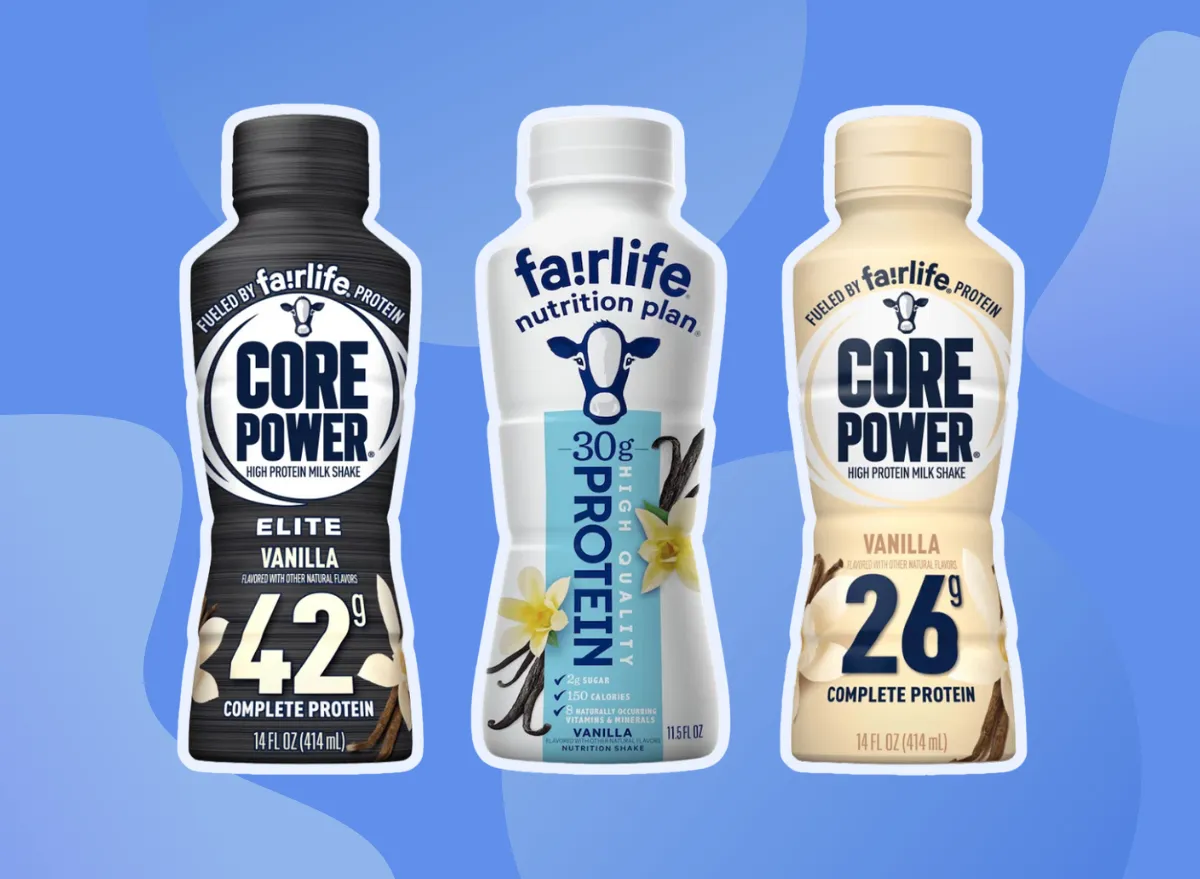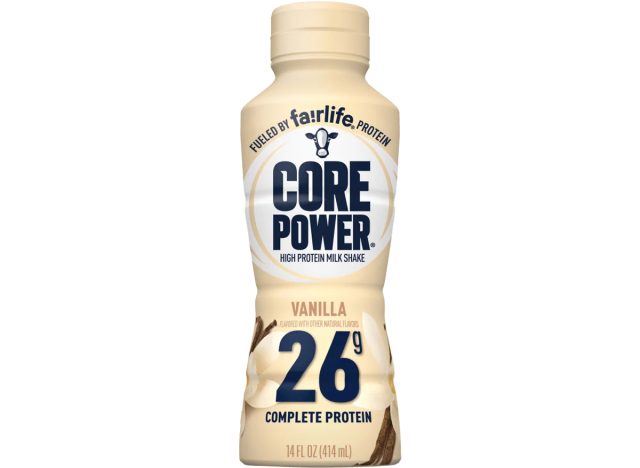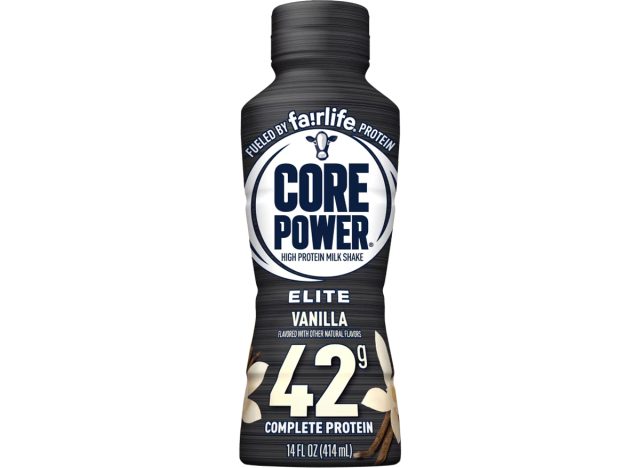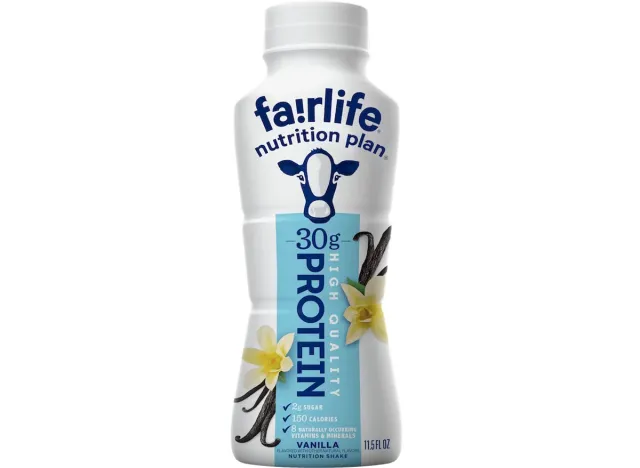Are Fairlife Protein Shakes Healthy? We Asked a Dietitian

Protein shakes have become a popular means to boost protein intake with a simple opening of a bottle and a gulp of the shake. Whether it’s for post-workout recovery, a quick breakfast option, or simply a low-lift way to increase daily protein intake, there’s no denying that protein shakes are here to stay. One brand that has captured quite a bit of attention in the protein shake world is Fairlife, renowned for its high protein content, delicious taste, and widespread availability.
As a dietitian, I have thoughts surrounding Fairlife and whether I consider it a healthy choice. The beverage does provide a significant amount of protein, which can be beneficial in muscle repair and growth. However, it’s also important to consider the overall nutritional profile, including any artificial sweeteners and calories, and how these fit with one’s dietary goals and taste preferences.
Curious to know more about my thoughts surrounding Fairlife? Keep reading to get the full scoop on this popular protein-packed drink. For more healthy shake options, don’t miss 12 Best Protein Shakes, According to a Dietitian.
Table of Contents
- What Are Fairlife Protein Shakes?
- Nutrition Information
- Ingredients
- Benefits of Fairlife Protein Shakes
- Potential Drawbacks of Fairlife Protein Shakes
- Are Fairlife Protein Shakes Healthy?
- Final Thoughts
What Are Fairlife Protein Shakes?
Fairlife shakes are dairy-based, high-protein, ready-to-drink beverages that support active lifestyles and nutritional goals. They are made with Fairlife’s signature ultra-filtered milk, a type of dairy product that undergoes a specialized filtration process. This process concentrates the protein content while reducing the amount of lactose and sugar, resulting in a milk that is both higher in protein and easier to digest for those with lactose intolerance.
These shakes are crafted to deliver a rich source of protein while maintaining a creamy texture and excellent taste.
Fairlife protein shakes are available in three different formulations and various flavors like chocolate and vanilla.
The three Farilife varieties include:
- Core Power: Core Power is a dairy-based, ready-to-drink protein shake with 26 grams of protein, 5 grams of sugar, and 170 calories per serving. Core Power is primarily designed for athletes and fitness enthusiasts, providing a high-protein drink that supports muscle recovery and exercise performance. It includes some essential electrolytes (like calcium) and carbohydrates to aid in post-workout recovery.
- Core Power Elite: For those with higher protein needs, Core Power Elite takes things up a notch, delivering a whopping 42 grams of protein per serving. Like Core Power, this option also contains electrolytes and carbohydrates to support post-workout recovery.
- Fairlife Nutrition Plan: Designed as a balanced option for everyday health, Fairlife Nutrition Plan is a ready-to-drink dairy-based drink with 30 grams of protein, 2 grams of sugar, and 150 calories per serving.It is a good choice for those looking to maintain or manage weight with a meal replacement or snack option. With 30 grams of protein, Fairlife Nutrition Plan offers more protein than Core Power but less than Core Power Elite.
Nutrition Information
Here is the nutrition information for Fairlife Core Power

Calories: 170
Fat: 4.5 g (Saturated fat: 3 g)
Sodium: 260 mg
Carbs: 6 g (Fiber: 0 g, Sugar: 5 g)
Protein: 26 g
Here is the nutrition information for Fairlife Core Power Elite

Calories: 230
Fat: 3.5 g (Saturated Fat: 2 g)
Sodium: 250 mg
Carbs: 8 g (Fiber: 0 g, Sugar: 8 g)
Protein: 42 g
Here is the nutrition information for Fairlife Nutrition Plan:

Calories: 150
Fat: 2.5 g (Saturated Fat: 1.5 g)
Sodium: 190 mg
Carbs: 3 g (Fiber: 0 g, Sugar: 2 g)
Protein: 30 g
Both varieties contain an impressive amount of protein while being relatively low in calories, fat, and carbohydrates. Both varieties also contain between 50-60% DV calcium, a nutrient that supports bone health and is considered an electrolyte.
Ingredients
Fairlife Protein Shakes provide a variety of ingredients. The ingredient lists for Fairlife Core Power and Fairlife Nutrition Plan are nearly identical, with only slight differences in ingredient proportions and the presence of added salt in Nutrition Plan.
Fairlife Core Power & Core Power Elite Ingredients:
- Filtered Lowfat Grade A Milk, Contains Less Than 1% of: Natural Flavors, Monk Fruit Juice Concentrate, Stevia Leaf Extract, Carrageenan, Cellulose Gel, Cellulose Gum, Acesulfame Potassium, Sucralose, Lactase Enzyme, Vitamin A Palmitate, Vitamin D3.
Fairlife Nutrition Plan Ingredients:
- Filtered Lowfat Grade A Milk, Contains Less Than 1% of: Natural Flavors, Cellulose Gel, Cellulose Gum, Carrageenan, Lactase Enzyme, Acesulfame Potassium, Sucralose, Monk Fruit Juice Concentrate, Salt, Stevia Leaf Extract, Vitamin A Palmitate, Vitamin D3.
The primary component, filtered low-fat grade A milk, supports the rich protein content and contributes significantly to the drink’s nutritional profile. Lactase enzyme inclusion is crucial for breaking down lactose, making these drinks suitable for most lactose-intolerant individuals.
The presence of cellulose gel and cellulose gum indicates the effort to achieve a smooth, consistent texture. While strong data showing that these ingredients are dangerous is lacking, some people choose to avoid them for concerns surrounding digestive sensitivity and potential allergies. These ingredients, derived from plant fibers, are generally recognized as safe by regulatory authorities. However, individuals with specific digestive issues or sensitivities might opt for alternatives to minimize the risk of adverse reactions.
Carrageenan, a common food additive, acts as a stabilizer to improve texture further. Limited data suggests this ingredient may be linked to increased inflammation, but more strong data is needed to confirm this.
To cater to various dietary needs, the beverage uses a blend of sweeteners, including acesulfame potassium, sucralose, monk fruit juice concentrate, and stevia leaf extract, providing sweetness without excessive calories.
Additionally, Vitamin A Palmitate and Vitamin D3 are fortified to provide essential nutrients. Since many Americans are not consuming adequate levels of vitamin D, this fortification may help people meet their needs.
Benefits of Fairlife Protein Shakes
High Protein Content
Fairlife Protein Shakes are an excellent source of protein, making them an ideal choice for individuals looking to build or maintain muscle mass. The ultra-filtered milk process ensures a higher concentration of protein compared to regular milk. Protein is crucial for maintaining and repairing body tissues and is essential for overall growth and development. It also plays a vital role in producing enzymes and hormones, supporting various cellular processes and immune function. Additionally, some data suggests it promotes satiety, potentially supporting weight management.
Lactose-Free
Through the inclusion of lactase enzyme, Fairlife Protein Shakes become accessible to those with lactose intolerance. This allows individuals who typically avoid dairy to enjoy the benefits of a milk-based protein shake without experiencing the usual digestive discomfort.
Low Sugar
These protein shakes have reduced sugar content, making them an alternative to traditional sugary beverages. The use of alternative sweeteners like monk fruit and stevia ensures that consumers can enjoy a pleasantly sweet flavor without the added calories of sugar or the potential blood sugar spike—a common concern for those managing diabetes.
Provides Key Nutrients Naturally
Since Fairlife protein shakes are made from real dairy milk, they are a natural source of many nutrients, like iodine, vitamin B12, and magnesium. For those who appreciate getting nutrients from natural sources (vs. having to add them in like what we see in some other shakes), this shake can fit the bill.
Potential Drawbacks of Fairlife Protein Shakes
Use of Acesulfame Potassium
Although Fairlife Protein Shakes use acesulfame potassium as a sweetener to maintain low sugar levels, some consumers have expressed concerns over potential health impacts associated with its long-term consumption, particularly how it may affect the gut microbiome. While regulatory agencies have deemed it safe, ongoing debates exist around artificial sweeteners and their effects, especially this one. There is some data linking sucralose to negative effects on gut health as well. As a dietitian, I am not convinced that occasional exposure to these ingredients is going to result in long-term negative health effects. Dose, frequency of consumption, and overall diet are all factors that need to be considered when determining risk.
Flavor Options
While the standard flavors of Fairlife Protein Shakes are popular, the variety is limited compared to other brands in the industry. While Fairlife shakes are available in classic vanilla, chocolate, and strawberry flavors, shakes by other brands come in flavors like Cold Brew Coffee and Cookies and Cream! This may restrict consumers seeking more diverse or innovative flavor profiles, leading them to explore different products for greater choice.
Not Vegan
Since the shakes contain dairy, they are not suitable for vegans or those allergic to dairy proteins.
Are Fairlife Protein Shakes Healthy?
Fairlife Protein Shakes can be considered a healthy option for many individuals, depending on their dietary needs and health goals. The high protein content and low sugar levels make them a favorable choice for those seeking to increase their protein intake without consuming excess sugar. However, the healthiness of these shakes can vary based on specific health conditions and dietary restrictions.
For individuals who require a low-protein diet, such as those with kidney disease, Fairlife Protein Shakes may not be suitable due to their high protein content. Furthermore, those sensitive to artificial sweeteners should be cautious, as Fairlife uses acesulfame potassium and sucralose, which some people may prefer to avoid.
When considering the various types of Fairlife Protein Shakes, it is essential to align choice with personal dietary needs. For instance, Core Power (26g protein) is ideal for a post-workout recovery shake, Core Power Elite (42g protein) is best for those with intense training regimens and require the extra protein, and Nutrition Plan (30g protein) is a lower-calorie option suitable as a meal replacement, snack, or part of a balanced meal, depending on the individual.
Final Thoughts
Fairlife Protein Shakes can serve as a convenient and nutritious shake for individuals looking to boost their protein intake while minimizing sugar consumption. However, it’s crucial to consider personal dietary requirements and health goals before incorporating them into your daily routine. For those who do decide to include Fairlife Protein Shakes in their diet, it is recommended to balance their intake with a variety of whole foods to ensure a comprehensive nutrient profile. Complementing the shakes with fresh fruits, vegetables, whole grains, and lean proteins can help maintain a well-rounded diet.
- Source: https://pmc.ncbi.nlm.nih.gov/articles/PMC1432575/
- Source: https://www.ams.usda.gov/sites/default/files/media/Cellulose%20TR%202001.pdf
- Source: https://pubmed.ncbi.nlm.nih.gov/38732613/
- Source: https://pmc.ncbi.nlm.nih.gov/articles/PMC9573946/
- Source: https://www.ncbi.nlm.nih.gov/books/NBK555990/
- Source: https://pubmed.ncbi.nlm.nih.gov/34368996/
- Source: https://www.accessdata.fda.gov/scripts/cdrh/cfdocs/cfcfr/cfrsearch.cfm?fr=172.800
- Source: https://pubmed.ncbi.nlm.nih.gov/35458244/









